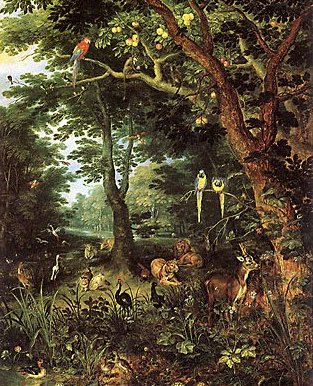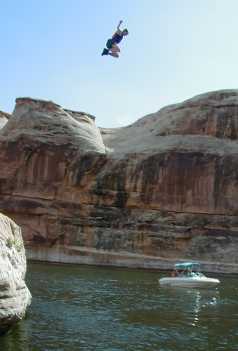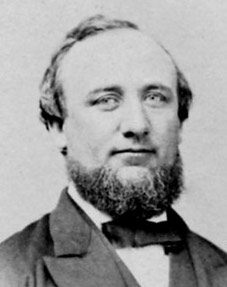
Reprinted from Meridian Magazine (13 Jan 2010).
©2010 by John P. Pratt. All rights Reserved.
| 1. Have you been thrown of the Garden of Eden? |
| 2. Comfort is a Harsh Taskmaster |
| 3. Cut Back on Comforts |
| 4. Eden In Our Day |
| 5. What Will the City of Zion Be Like? |
| 6. Conclusion |
| Notes |
Would you have voluntarily left the Garden of Eden? Adam and Eve lived in a garden that was planted by the Creator of the earth. It must have been pretty posh. They had many kinds of wonderful fruit and delicious vegetables to eat, available for the picking. They had clear streams that watered the garden. They had it made, with all of their needs met. If you had been in their place would you have said, "You know, this is all very nice, but we would learn more and develop our talents better if we just leave this paradise and head out into the lone and dreary world and learn to fend for ourselves"? No? Well, neither did Adam and Eve leave voluntarily.
 |
Many of us live in more comfort than Adam and Eve probably did in the Garden of Eden. We have both hot and cold running water, right inside of our homes. We have natural gas for heating, a sturdy, insulated dwelling to protect from rain, snow, and wind. We have the marvel of electricity and all the amazing conveniences that come with it. We have instant knowledge from the internet and on-demand entertainment. These comforts are not only expected, they are understood to be a minimum standard of living to be out of the poverty level. That may mean that most of us are living better that Adam and Eve were when they were in the Garden of Eden. What kind of a dwelling did they have? Did they have any of those conveniences?
 |
In fact, the mind conditioning devices such as the mainstream media remind us daily that the goal of life should be to be surrounded in luxury. We must have diamonds and expensive watches and posh cars and the latest of every convenience. We are told that it does not matter that we have no money to pay for these extravagances, that we can borrow the money and let others pay for them when we declare bankruptcy or renege on paying our credit cards. What is important is that we have everything immediately, without waiting to actually pay the price.
Why is it that riches are so often associated with evil in the scriptures? In Lehi's vision of the Tree of Life, he saw that the wicked were represented as being adorned with expensive luxury clothing and living in a great an spacious building (1 Nephi 8:26-27). The Savior told the rich young man to sell all that he had and to give it to the poor. He then explained to his disciples, "it is easier for a camel to go through the eye of a needle, than for a rich man to enter into the kingdom of God" (Mat. 19:21-24). So why is it that riches are associated with evil? Surely there are some righteous wealthy people. Is not our Creator the wealthiest of all? So what's the big problem with being rich? As Tevia in Fiddler on the Roof asked, "Would it spoil some vast eternal plan if I were a wealthy man?"
I rarely know the answers to the questions asked in my articles, and I certainly do not understand the problem with wealth. But there is one little aspect of wealth that is so obvious that it cannot be overlooked. There is a natural tendency to spend our wealth on ourselves, rather than to help others. And even if one would use wealth to edify others and alleviate their pain, there is usually a strong desire to meet certain wants (which are called needs) first. Thus, if we were to win a million dollars, there would probably be new suits of clothes ordered, new cars, etc., all under the umbrella of "necessities", before donations were made to the poor.
 |
I know of no one who has summarized the problem better that Kahlil Gibran in The Prophet:
". . . comfort, and the lust for comfort, that stealthy thing that enters the house as a guest, and then becomes a host, and then a master. Ay, and it becomes a tamer, and with a hook and scourge makes a puppet of your larger desires. Though its hands are silken, its heart is of iron. . . . Verily, the lust for comfort murders the passion of the soul, and then walks grinning in the funeral."[3]
(You may wish to reread and ponder those truths a few minutes before reading on!) If comforts are to be avoided to the extent that they become our masters, then are there any comforts that are acceptable? Do not some of them give us more time to ponder, pray, and serve others? If so, then what are the conveniences worth having? The Prophet Brigham Young may have given a partial answer to this question when he prophesied that many new inventions would come that would give the saints more time to do temple work. Is that what we use our free time for? Or do we lavish it on ourselves? Is there not a responsibility to use our time wisely? Is that not what we will be judged on someday?
Have you ever noticed that we want to avoid the most God-like things we can do? The Lord is a great gardener, but how many of us enjoy gardening? We usually hire others to raise our food and nearly always to butcher it. Heavenly Father is a great parent, but how many of us hire someone else to raise our children for us? The Lord was a master teacher, but we hire other teachers to teach our families. The Lord was the servant of all, but we prefer to hire servants to do the service which we should perform. Many people feel that success is to be so wealthy that one need to do no work whatsoever. And yet Jesus taught that we should lose ourselves in the service of others, and that he who would be greatest should be the servant of all (Luke 22:24-27).
So what do we do with our time? This generation is absorbed in entertainment, in entitlements, self-indulgence and increasing comfort. And commercials are constantly telling us we simply "must" have their new gadget/pill/food or we cannot be happy. And that includes most of us. How can we break out of all the conditioning that we have had to be weak, dependent, mindless zombies? Henry David Thoreau suggested an answer. He wrote, "The head monkey at Paris puts on a traveler's cap, and all the monkeys in America do the same. I sometimes despair of getting anything quite simple and honest done in this world by the help of men. They would have to be passed through a powerful press first, to squeeze the old notions out of them . . ."[4] Perhaps we cannot voluntarily overcome our blindness conditioning and require a "press" to have old traditions and habits to be squeezed out of us.
In my first writing of this article, I had a "top-ten" list of comforts to do without, a least on a temporary basis until you prove to "Comfort" just who is really boss. Then I looked at my list and realized that it had been tailored for me and the reader might have very different wants and needs and even definition of comfort. So I leave it as an exercise for the reader to make a personal list.
 |
Thus, it is here suggested that you make a list of perhaps ten things you can try doing without on a short trial basis. Going without them for a while will indeed tend to indicate which are needs and which are wants. Who knows, you may end up crossing some things off both lists of needs and wants and do without them altogether.
We have all forgotten some item when we leave for vacation. This training suggests fighting the impulse to turn the car around and return to get it. When I was Scoutmaster, I usually did not supply a list of what would be needed on the trip. If the boys (and their irritated parents) forgot something, then they did without, or shared with a friend. Sometimes it was an opportunity to show them it was not needed at all. In any case, the lesson was learned and would be remembered for a long time.
Here are a few suggestions of some conveniences which have been purposely avoided either temporarily (to better appreciate them) or permanently (to rid ourselves of dependence on them). The famous singing group, the Lennon Sisters, report that even when wealthy they did not have a dishwasher in their home but instead sang together as they did the dishes. I knew a missionary who slept on the tile floor during his mission so that he wouldn't get soft. There are people who park their cars a few blocks away from their destination in order to get some exercise. I knew a man who made omelets including weeds collected from fields. He lived through the last depression that way. He used purslane, shepherd's purse, mallow, pig weed, and lamb's quarters. Some people go barefoot every chance they get, others keep fit by exercising without equipment. I know one man who heated his home by burning junk mail one day per week. Another slept outside one day per month year round. Many people have thrown out their televisions and microwaves. If you want to conquer your personal "Comfort Monster", you will be able to think of similar ways of taming him to be a whimpering puppy relegated to a corner of your dwelling.
The Prophet Joseph Smith explained that when Adam and Eve were driven from the Garden of Eden they went to dwell at Adam-ondi-Ahman, which is located in Missouri (D&C 116). The latter-day saints were commanded to go to this state to prepare for the founding of the city of the New Jerusalem by building a temple in the city of Independence (D&C 84:4). They were told that the city could only be established on the principles of the Celestial Kingdom. To make a long story short, they failed in this attempt and were "driven out" of the Garden of Eden area. This came as a big surprise to them, but the Lord explained what the commandments were that they had failed to keep (D&C 101:6-8). Then he made it very clear that we will not be allowed to go back to redeem the land of Zion until we learn to live the celestial law.
 |
So how are we doing? Are we ready to live the law of consecration right now? Do you think we are closer to being ready to live it than the early saints who tried to do so? George Q. Cannon, when a counselor in the First Presidency of the LDS Church to Brigham Young, gave a sermon in 1869 on the subject at General Conference. He said,
"Nearly 37 years ago the Prophet Joseph, or rather the Lord, through him, gave revelations upon the Order of Enoch. . . . The people were not prepared to carry them out. These principles . . . have never been lost sight of by the President and those associated with him. It has been their aim from the day they were given until today, the 6th day of April, 1869 to bring the Latter-day Saints to such a condition of union, faith and knowledge that they would receive these principles and carry them out in their lives. . . . Unless we as a people arrive at such a standard of faith and perfection as to practically carry them out, we are assured, on the best of authority, the we cannot be permitted to go back and build up the Center Stake and fully accomplish the redemption of Zion. . . . One of the greatest calamities that could be thought of by us as a congregation, or a Church, today, would be to learn from the Lord through His servants that we should not be permitted to go back to build up the Center Stake of Zion. The edict pronounced by the prophet Moses, when he told Israel that not one who had arrived at the age of twenty-one years should ever enter the Promised Land had not a greater effect upon Israel than the condition I have just referred to would have upon the Latter-day saints."[6]
 |
It has been another 140 years since Pres. Cannon's speech. Do you believe we are closer or farther from being prepared to go back to live the Celestial Law, to be free from debt and "stand independent" (D&C 78:14) and build that city? If he was so upset back then, how would he feel now about our spirtual preparedness? I leave those questions for the reader to decide.
Have you thought much about what the city of Zion will be like? Will it have huge mansions in it, as we now believe successful people must have? Will everyone have a mortgage on his home? Will there be any poor people? Will there be fences between the yards? Will there be swimming pools, tennis courts and football stadiums? (I'm sure glad I only ask the questions!) Will there be automatic sprinkler systems, indoor plumbing, and sewers? Will there be parks, waterfalls, and natural beauty? Will there be high-rise apartment buildings, supermarkets and freeways? Will we use power tools? Will we be wearing designer clothes, with lots of jewelry? Will we dye our hair and have it done up in lots of ornate shapes? Will our garments be plain and their beauty the workmanship of our own hands (D&C 42:40)? For that matter, what will be the mode of transportation? Will there be automobiles, horse and buggies, or teleportation?
Why am I asking all these questions, with no intention whatsoever of attempting to answer them? Because my real question is, no matter how we picture the New Jerusalem, we can ask, "Are we preparing right now to live in a way that we believe they will be living in that city?" One thing we do know, is that there will be no poor among them, as they will consecrate their properties for the support of the poor (D&C 42:30). And are we teaching our children to truly live the principles of our religion, to prepare to live in the presence of God? This article began by pointing out that most of us live in much more comfort than we need. Surely an attempt to cut back on our comfort level could be combined with giving our excess to the poor. That would be a step towards living the celestial law.
Adam and Eve were forcibly removed from the Garden of Eden. Even though the cause of that is attributed to their transgression, this article suggests that it is good not to live in too much comfort, and goes so far as to suggest that it just might have been a good idea for them to have considered leaving the garden on their own. We become slaves to comfort to a degree that it robs us of our freedom and independence. Perhaps we should voluntarily give up some of our comforts of life. This idea fits well with helping the poor, for we can give to them what we do not need, and discover that we need much less than we had thought. The Latter-day saints have again been removed from the area of Eden for failing to live a celestial law, and the Lord has told us we need to live that law in order to return there to build the New Jerusalem someday. Now that so many more are in need, it may be a good time to forgo some of our comforts, help those in need, and thus prepare ourselves spiritually to return to build the New Jerusalem.